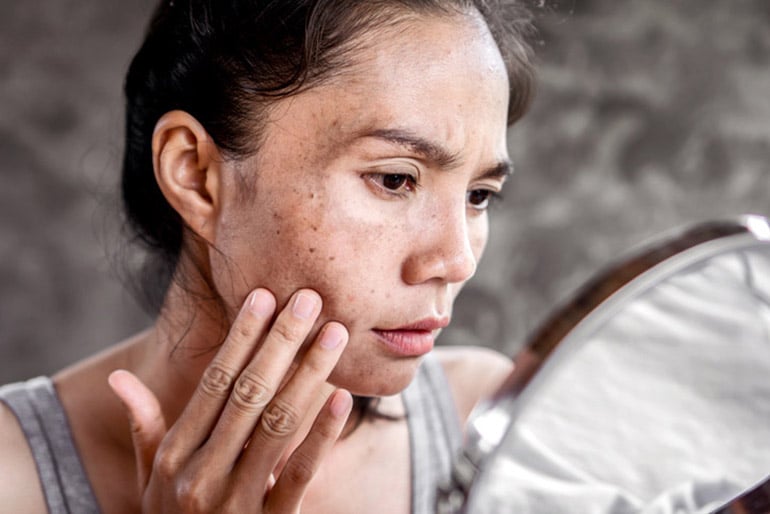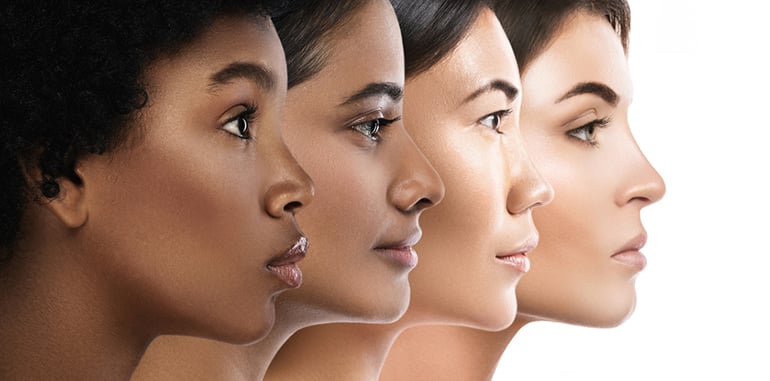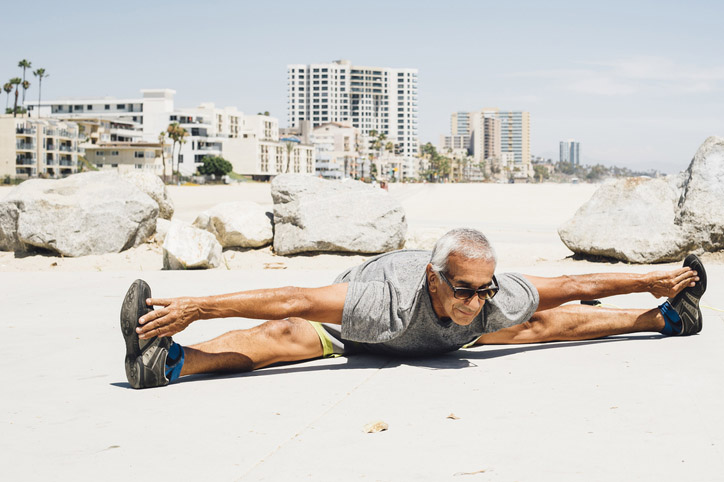Dark spots. Sun spots. Age spots.
No matter what you call them, you don't want them. Often caused by sun damage, they've been widely acceptable as unavoidable, particularly for sun worshippers, beach lovers, and frequent sand-and-sea vacationers. Fortunately, unlike a leopard, you might be able to change them.
For this edition of Ask a Pro, we spoke to Dr. Marie Jhin, Chief Medical Officer of Musely and Board-Certified Dermatologist, to learn more about what's medically known as hyperpigmentation, including what causes it (spoiler: it might not be those darn UV rays!), how to prevent it, and even an option for potentially reversing it.
What causes hyperpigmentation?
Any kind of darker discoloration of the skin is considered hyperpigmentation, a term that means exactly what it sounds like — too much color (melanin) created and deposited in a particular spot or area. According to Dr. Jhin, this can happen after sun exposure, trauma, hormonal changes or from skin conditions, such as a rash or acne.
It's also not necessarily seasonal. Melasma and hyperpigmentation can worsen at any time of year, she warns, and adds, People with very fair skin who burn easily and/or have a family history of skin cancer should take extra precautions year round.
However, she says, it is exacerbated with heat or overexposure to the sun, which is why those who are struggling with these conditions should be extra cautious during warmer seasons.
How can frequent travelers and beach-goers avoid hyperpigmentation?
There are several ways to protect your skin from too much sun exposure. Dr. Jhin's top tips are to wear a wide-brimmed hat, which creates a physical barrier, or applying mineral sunscreen. In fact, she can't emphasize the importance of sun protection enough, saying. Always, always wear and carry sunscreen or sun protective clothing whenever possible!” especially between noon and 4 PM, when the sun is at its most powerful.
She recommends The Day Cream, a hydrating mineral sunscreen that offers protection with SPF 30-50. It's formulated with titanium dioxide and zinc oxide, it has demonstrated efficacy in reducing redness associated with vascular melasma and rosacea. Its three-ounce size is ideal for travel, since the TSA recalled their ruling of sunscreen as a medically necessary liquid, which would have made it exempt from the liquid restrictions.
However, as with all sunscreens, this isn't a set-it-and-forget-it solution. Consistent daily application and reapplying throughout the day are both crucial, as neglecting sun protection could lead to new dark spots and potentially disrupt your treatment progress.
What about spots in less exposed areas? Where do they come from?
While spots on your face and body are more likely caused by over-exposure to the sun, private areas have a few surprising causes, including hormonal changes such as pregnancy; friction between skin folds or skin and clothing; texture change from aging; hair removal; or hormonal or endocrine conditions, such as Polycystic Ovary Syndrome (PCOS), Dr. Jhin reveals. So it's not always the sun's fault if you have some hyperpigmentation, and it's definitely something to look into. If it's really bothersome, though, The Private Creamis a product safe for sites unseen.
How will I know if a dark spot is just a dark spot or if I should have a dermatologist take a look?
It's been well-publicized since sun damage and skin cancer has become a hot topic that one should take frequent inventory of their body's largest organ. However, with high co-pays and tight schedules, it can be hard to prioritize, or even difficult to determine if you're being alarmist or dismissive (depending on which side of that spectrum your attitude takes you!).
According to the doctor, It's a good idea to book an appointment to see a dermatologist about dark spots or patches if they randomly appear on your skin or seem to be questionable. Dark spots are typically harmless, but getting them checked out by a dermatologist can help you address any underlying medical conditions and prevent them from worsening she says.
Specific reasons for concern over dark spots include symptoms such as itching, bleeding, rapid growth, changes in shape or color, or a family history of skin cancer. And even if they're not dangerous, a dermatologist is where you'd go to find solutions to help fade them.
How can I brighten dark spots?
As the Chief Medical Officer of Musely, Dr. Jhin has a preference for the brand's clinically tested formulas and effective ingredients.
She says, Our dark spot treatments such as The Spot Cream and The Body Cream are formulated with ingredients such as hydroquinone which works by blocking the production of melanin or pigment cells thus lightening some of those pigmented areas. Musely has some formulas that use the highest strength of hydroquinone available (up to 12%) and also contain other active ingredients such as azelaic acid, tranexamic acid, and tretinoin that are clinically proven to treat hyperpigmentation and dark spots. When combined with tretinoin, hydroquinone is very effective for speeding up skin cell turnover to repair sun damage, while preventing new, excess pigments from being formed in skin cells.
We all know how important it is to Plan with a Pro when it comes to travel. After all, Travel Advisors Get You There. But equally important is making sure advisor pros are supported and surrounded by pros themselves, particularly when it comes to topics peripheral to travel. That's where TravelBlogue comes in as we Ask a Pro on your behalf to provide you with tips and advice from fitness, health, nutrition, mental health, beauty, wellness, and travel gear experts from around the world and put it all at advisor fingertips.







